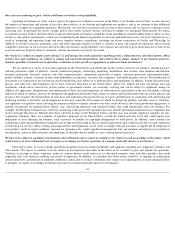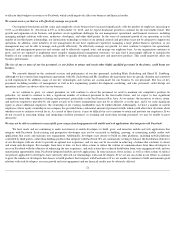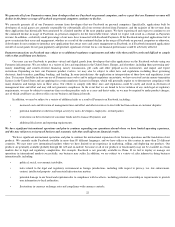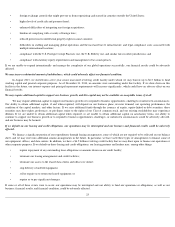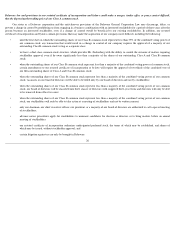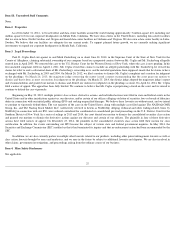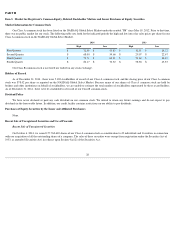Facebook 2014 Annual Report Download - page 21
Download and view the complete annual report
Please find page 21 of the 2014 Facebook annual report below. You can navigate through the pages in the report by either clicking on the pages listed below, or by using the keyword search tool below to find specific information within the annual report.
and unproven. Any negative outcome from any such lawsuits could result in payments of substantial monetary damages or fines, or undesirable changes
to our products or business practices, and accordingly our business, financial condition, or results of operations could be materially and adversely
affected. Although the results of such lawsuits and claims cannot be predicted with certainty, we do not believe that the final outcome of those matters
relating to our products that we currently face will have a material adverse effect on our business, financial condition, or results of operations. In
addition, we are currently the subject of stockholder class action suits in connection with our IPO. We believe these lawsuits are without merit and are
vigorously defending these lawsuits.
There can be no assurances that a favorable final outcome will be obtained in all our cases, and defending any lawsuit is costly and can impose a
significant burden on management and employees. Any litigation to which we are a party may result in an onerous or unfavorable judgment that may not
be reversed upon appeal or in payments of substantial monetary damages or fines, or we may decide to settle lawsuits on similarly unfavorable terms,
which could adversely affect our business, financial conditions, or results of operations.
We may incur liability as a result of information retrieved from or transmitted over the Internet or published using our products or as a result of
claims related to our products.
We have faced, currently face, and will continue to face claims relating to information that is published or made available on our products. In
particular, the nature of our business exposes us to claims related to defamation, intellectual property rights, rights of publicity and privacy, and personal
injury torts. This risk is enhanced in certain jurisdictions outside the United States where our protection from liability for third-
party actions may be
unclear and where we may be less protected under local laws than we are in the United States. We could incur significant costs investigating and
defending such claims and, if we are found liable, significant damages. If any of these events occur, our business and financial results could be adversely
affected.
Our CEO has control over key decision making as a result of his control of a majority of our voting stock.
Mark Zuckerberg, our founder, Chairman, and CEO, is able to exercise voting rights with respect to a majority of the voting power of our
outstanding capital stock and therefore has the ability to control the outcome of matters submitted to our stockholders for approval, including the
election of directors and any merger, consolidation, or sale of all or substantially all of our assets. This concentrated control could delay, defer, or
prevent a change of control, merger, consolidation, or sale of all or substantially all of our assets that our other stockholders support, or conversely this
concentrated control could result in the consummation of such a transaction that our other stockholders do not support. This concentrated control could
also discourage a potential investor from acquiring our Class A common stock due to the limited voting power of such stock relative to the Class B
common stock and might harm the trading price of our Class A common stock. In addition, Mr. Zuckerberg has the ability to control the management
and major strategic investments of our company as a result of his position as our CEO and his ability to control the election or replacement of our
directors. In the event of his death, the shares of our capital stock that Mr. Zuckerberg owns will be transferred to the persons or entities that he
designates. As a board member and officer, Mr. Zuckerberg owes a fiduciary duty to our stockholders and must act in good faith in a manner he
reasonably believes to be in the best interests of our stockholders. As a stockholder, even a controlling stockholder, Mr. Zuckerberg is entitled to vote his
shares, and shares over which he has voting control as a result of voting agreements, in his own interests, which may not always be in the interests of our
stockholders generally.
We plan to continue to make acquisitions, which could harm our financial condition or results of operations and may adversely affect the price of
our common stock.
As part of our business strategy, we have made and intend to continue to make acquisitions to add specialized employees and complementary
companies, products, or technologies. We may not be able to find suitable acquisition candidates, and we may not be able to complete acquisitions on
favorable terms, if at all. In some cases, the costs of such acquisitions may be substantial. For example, in 2014 we paid approximately $4.6 billion in
cash and issued 178 million shares of our Class A common stock in connection with our acquisition of WhatsApp, and we paid approximately $400
million in cash and issued 23 million shares of our Class B common stock in connection with our acquisition of Oculus. We also issued a substantial
number of RSUs to help retain the employees of these companies. There is no assurance that we will receive a favorable return on investment for these
or other acquisitions.
In the future, we may pay substantial amounts of cash or incur debt to pay for acquisitions, which could adversely affect our liquidity. The
incurrence of indebtedness would also result in increased fixed obligations, increased interest expense, and could also include covenants or other
restrictions that would impede our ability to manage our operations. We may also issue equity securities to pay for acquisitions and we regularly grant
RSUs to retain the employees of acquired companies, which could increase our expenses, adversely affect our financial results, and result in dilution to
our stockholders. In addition, any acquisitions we announce could be viewed negatively by users, marketers, developers, or investors, which may
adversely affect our business or the price of our common stock.
18










